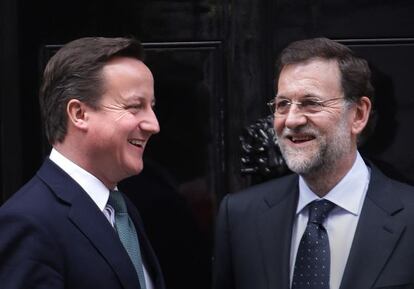Rajoy gets no concessions on Gibraltar
London refuses to discuss the Rock's future without appeal to its inhabitants

Neither the threats accompanying Argentina's claim to the Falklands, nor the cordial approach of an EU partner and ally such as Spain in its claim to Gibraltar, seem to have the least effect on London's stony refusal to negotiate on the future of its last colonies. In spite of the ideological affinity that both men emphasized in their first personal encounter on Tuesday, Spanish Prime Minister Mariano Rajoy did not manage to extract the tiniest concession from his British counterpart, David Cameron.
In their media appearance after a lunch at No. 10 Downing Street, the two leaders admitted they had different positions on the contentious issue, their only agreement being that their respective foreign ministers, William Hague and José Manuel García-Margallo, would go on discussing it.
Cameron, however, left no room for hope. After emphasizing that his position "has not changed," he insisted that it was the people of Gibraltar who "must decide on their future."
"We are not going to negotiate about Gibraltar without bringing in the Gibraltarians. That has to be understood," he added.
Though Rajoy was laconic in his public appearance, sources in the prime minister's office explained he had endeavored to put his host in Madrid's position. To wit: that there are two separate planes of dialogue, one concerning sovereignty, reserved to Spain and the United Kingdom; and another concerning cross-border cooperation, in which the two countries' authorities need to participate along with the representatives of the Rock and of the district on the Spanish side. But neither on the first, which concerns the nucleus of the conflict, nor on the second, of local character, was any compromise reached.
What Cameron and Rajoy did agree on was that the letter they have addressed to the presidents of the European Commission and the European Council, which has also been signed by 10 other European leaders - but not French President Nicolas Sarkozy nor German Chancellor Angela Merkel - "is not a front of anyone against anyone" and is open to new signatories.
The letter underlines the need to accompany austerity measures with others that will stimulate growth. However, it does not suggest softening the fiscal adjustment, but rather calls for an advance in deregulation and liberalization both at the national level (with labor-law reforms, such as the one just enacted in Spain), at the European level (creating a real single market in sectors such as digital media, energy and services), and at the global level (with free trade agreements between the EU and the emerging countries).
Cameron, as favorable to the single market as he is allergic to political union, showed pleasure at the Spanish leader's support for the letter, which moreover breaks with the image of isolation created last December by the British prime minister's dissociation from the fiscal pact subscribed to by the majority of EU countries.
Both leaders looked at the situation of the euro zone after the 11th-hour agreement reached early on Monday on a second bailout plan for Greece, but Cameron made it clear that his country had no plans to abandon the pound, pointing to the advantages involved in this position: among others, the benefits of a monetary policy more flexible than that of the European Central Bank.
Tu suscripción se está usando en otro dispositivo
¿Quieres añadir otro usuario a tu suscripción?
Si continúas leyendo en este dispositivo, no se podrá leer en el otro.
FlechaTu suscripción se está usando en otro dispositivo y solo puedes acceder a EL PAÍS desde un dispositivo a la vez.
Si quieres compartir tu cuenta, cambia tu suscripción a la modalidad Premium, así podrás añadir otro usuario. Cada uno accederá con su propia cuenta de email, lo que os permitirá personalizar vuestra experiencia en EL PAÍS.
¿Tienes una suscripción de empresa? Accede aquí para contratar más cuentas.
En el caso de no saber quién está usando tu cuenta, te recomendamos cambiar tu contraseña aquí.
Si decides continuar compartiendo tu cuenta, este mensaje se mostrará en tu dispositivo y en el de la otra persona que está usando tu cuenta de forma indefinida, afectando a tu experiencia de lectura. Puedes consultar aquí los términos y condiciones de la suscripción digital.








































